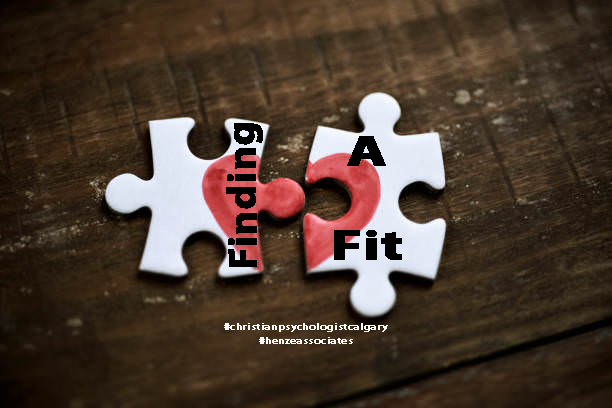Christian Psychologist Calgary: Why is it that so many people have such a difficult time finding quality therapy that works for them?
 Spend any amount of time searching for the right psychologist in Calgary, and you will be inundated with articles about how to choose a therapist. As of this writing, there are over one hundred and twenty million articles written on this subject, and climbing! These are not articles that have been written and immediately forgotten; they rank among some of the most popular articles on the internet. Many of these posts and articles have been read by millions of people who undoubtedly have carefully followed the advice they offer.
Spend any amount of time searching for the right psychologist in Calgary, and you will be inundated with articles about how to choose a therapist. As of this writing, there are over one hundred and twenty million articles written on this subject, and climbing! These are not articles that have been written and immediately forgotten; they rank among some of the most popular articles on the internet. Many of these posts and articles have been read by millions of people who undoubtedly have carefully followed the advice they offer.
They are filled with suggestions about talking to your friends about their favourite therapist. Making sure your psychologist practices some “evidence-based” therapy like CBT or ACT. Making sure the counsellor has a similar gender or ethnic background to your own. Making sure you like the way a phone conversation with the practitioner went and ensuring that the provider will direct bill an insurance company. Evaluating how ethically the therapist behaves and ensuring that the therapist specializes in fixing what you believe is wrong.
Yet, the frustration levels are not getting any lower for so many people here in Calgary. Many of them have bounced from one counsellor, social worker and psychologist to another for years with little to no success.
Something is not working.
Sadly, we’ve only known since 1957 that these selection methods rarely work and what works better, but that information rarely gets presented. Of course, some of that omission is the self-serving biases of ideologues seeking to sell their particular therapy as a means of healing anything in everyone. Some also stems from the gender, economic, social and racial issues that continue to create a highly politicized environment in nearly every field. But the vast majority of this omission likely results from how siloed the field of psychology has become and how little many therapists understand of what is happening outside of their specialties.
Christian Psychologist Calgary: Discover the essential elements of client-therapist fit.
Before we go on, take a few minutes to go through the below web story.
Beginning in the 1930s, psychological researchers began to suspect that, despite the proliferation of different psychotherapy brands, there wasn’t a lot of difference between them. The somewhat-infamous Hans Eysenck swiftly concluded that this was mostly the result of psychotherapy providing no benefits beyond friendship and that any changes seen were nothing more than spontaneous remission. To say that subsequent research has been unkind to his ideas and his research skills would be a significant understatement. However, the backlash against him sparked a search for the core elements of healing that continues today.
By the early 1960s, entire books were being written studying what began to be called “Common Factors” in psychological and related mental and emotional health treatments. As the research started to come in, social scientists discovered that all of the different techniques used in various therapies accounted for less than 1% of differences in the healing journey’s studied. They found that matching clients in terms of gender, economic, social and racial factors resulted in nearly no benefits. Though psychologists used very different language to talk about it, the most successful were offering almost all of the same elements to their clients. All told, the research found that up to 70% of the change people experienced in therapy resulted from factors all therapies and competent therapists have in common.
The problem is, those are the elements almost no one is writing articles about, and what prospective clients then never know to focus on.
So, what really matters as you select an Alberta therapist or a Calgary Christian Psychologist?
A collaborative agreement on goals and values:
As early as 1979, a researcher named Bodin described what he called a “Working Alliance” in therapy as being essential to healing. A working alliance, he believed, was a trusting bond that had merged with a consensus and collaboration on goals and tasks to be performed. Later, researchers studied the role of values and addressed the importance of both client and therapist holding similar beliefs about what is important, worthwhile, desirable or good.
Because our values motivate and guide our actions, goals, and attitudes toward life and relationships, there must be at least a significant degree of alignment between client and therapist. It’s not enough that we agree on the goal of getting well; we also need to decide on what “Well” is and what is an honourable and ethical way of arriving there.
 Many researchers have discounted the value of client-therapist matching based on values and spirituality. They contend that the matching they have tried to do fails to deliver measurable benefits. However, when their actual matching procedures are unpacked, it quickly becomes apparent that this finding’s primary reason is mostly related to how complex spirituality and values are and how impossible it is for any researcher to track enough elements to study a fit.
Many researchers have discounted the value of client-therapist matching based on values and spirituality. They contend that the matching they have tried to do fails to deliver measurable benefits. However, when their actual matching procedures are unpacked, it quickly becomes apparent that this finding’s primary reason is mostly related to how complex spirituality and values are and how impossible it is for any researcher to track enough elements to study a fit.
For example, I have some Roman Catholic premarital counselling couples coming for therapy precisely to choose the best form of birth control and some Baptist couples who are morally opposed to birth control. I have worked with Seventh Day Adventist clients who have expressed concern that I would disagree with their (essentially) Kosher dietary choices and others from the same denomination who come into my office for therapy while eating their late lunch, which consists of a decidedly non-Kosher Canadian Pizza.
Given that the range of beliefs is this wide for members of even the same denomination, it is not surprising that researchers can do so little with it. However, it is still one of the most critical areas to consider when choosing a psychologist or counsellor, and discerning if a therapist fits is a task any individual client can easily accomplish.
Two of the most common locally searched terms in psychology are Christian Counselling Calgary and Christian Psychologist Calgary. People are searching for these terms because they believe it is easier to agree on the remaining therapy steps if they are first assured that their beliefs and values will be respected. And, they’re right – few clients find any sort of fit with a therapist until a consensus on these elements has been reached.
Empathy:
 Empathy is the capacity to understand and co-experience the emotions of another person. Empathy is a common experience to most people on the planet and, in its intermittent or constant absence, marks the person as a psychopath. Obviously, it would be a rather poor idea to choose a psychopath as a therapist, but they are rare. I’ve only ever met one therapist who seemed to fall under that heading in well over two decades of practice.
Empathy is the capacity to understand and co-experience the emotions of another person. Empathy is a common experience to most people on the planet and, in its intermittent or constant absence, marks the person as a psychopath. Obviously, it would be a rather poor idea to choose a psychopath as a therapist, but they are rare. I’ve only ever met one therapist who seemed to fall under that heading in well over two decades of practice.
The most effective therapists do not merely possess empathy; they are Empaths. The term “Empath” is often used in a spiritual or a SciFi sense to describe an individual who has a supernatural ability to read another’s emotions from afar. While that sort of power is obviously fiction, the concept is most definitely based on reality.
In psychological terms, an “Empath” is referred to as a “Highly Sensitive Person.” (HSP) An HSP or an Empath is an individual with a high degree of emotional intelligence merged with a strongly intuitive thinking style. They possess the highly developed ability to read what others around them are thinking and feeling to such a degree that they are often at risk of taking on others’ emotions as their own. As a result, empathic individuals tend to feel anxious and drained by large crowds of people and need to guard themselves carefully, or their boundaries will crumble, leaving them overwhelmed and burnt out.
One of my more vivid memories of Graduate School is from the “Welcome to The Program” assembly, where both of the chairs of the department urged anyone there who could do anything else for a profession to leave and do that instead. They spoke the truth. Psychology is often described as the most challenging medical profession because it is the highly empathic people who make the most effective therapists who are also the most vulnerable to being destroyed by the occupation. After all, they often care too much.
It’s a psychologists’ job to take careful ownership of their own mental health and cope with the risks inherent in that degree of personal sensitivity. It’s the job of a prospective client to find a psychologist who can feel and experience along with them.
Therapeutic Alliance:
The concept of a therapeutic alliance is one of the most studied elements of successful psychotherapy and is also one of the most important determining factors. Most research suggests that therapists who can create better alliances with various clients are generally more effective. The problem is, far too many researchers have invented their own definitions of what a therapeutic alliance means – leading to significant confusion.
The majority of research focuses on the quality of the relationship, the degree of agreement about the client’s problem, what needs to be done to fix it, the willingness to work together, and the degree of trust and confidence the client feels towards the therapist. In short, even those in agreement mash together several factors and somewhat blend it with the concept of a working alliance.
 However, even if those elements are challenging to describe, they are much less difficult to feel. By the end of most first dates, most people can step back from the evening and decide if they feel the other person is serious about a relationship (vs. looking for a hook-up) and is a trustworthy and honourable person. It’s not that hard to determine if they are going in the same direction and hold the same values in life.
However, even if those elements are challenging to describe, they are much less difficult to feel. By the end of most first dates, most people can step back from the evening and decide if they feel the other person is serious about a relationship (vs. looking for a hook-up) and is a trustworthy and honourable person. It’s not that hard to determine if they are going in the same direction and hold the same values in life.
Ethically speaking, of course, a therapeutic relationship can never be a dating relationship, but all relationships have a high degree of similarity and form in very similar ways. Human beings have an innate sequence of steps we routinely take to discern a commonality of values and direction. If a friend told you that you should commit to marrying someone because you liked their text messages, you would laugh at them. Yet, most people choose their psychologist solely based on what some random copywriter at an ad agency wrote about them on their website! (Just for the record, I write my own!)
This is why even the advice to talk via phone before choosing a psychologist is such a disastrous suggestion. Psychotherapy is a uniquely human and vulnerable interaction. If you are going to spend hours sharing your deepest secrets with someone, you owe it to yourself to take at least a full session to build a working alliance that feels right.
Positive regard/affirmation:
 In 2011, two researchers by the names of Farber & Doolin found that unconditional positive regard was the most significant predictor of positive outcomes in psychodynamic therapies. Of course, this outcome surprised precisely no one who had trained under a Rogerian or person-centred treatment model. Rogers repeatedly described this element as the most crucial element of effective therapy.
In 2011, two researchers by the names of Farber & Doolin found that unconditional positive regard was the most significant predictor of positive outcomes in psychodynamic therapies. Of course, this outcome surprised precisely no one who had trained under a Rogerian or person-centred treatment model. Rogers repeatedly described this element as the most crucial element of effective therapy.
Researchers have described this element using a wide variety of terms, including acceptance, caring, spontaneous praise, non-possessive warmth, level of regard and unconditionality of regard. Theologians have spilled barrels of ink discussing the mystery contained in Genesis 1:27 description of humanity having been, “Made in the image of God.”
Walt Whitman once said:
Why should I wish to see God better than this day?
I see something of God each hour of the twenty-four, and each moment then,
In the faces of men and women I see God, and in my own face in the glass,
I find letters from God dropt in the street, and every one is sign’d by God’s name,
It matters not at all if we start with poetry, theology or psychology, all of them converge on one central point: Humanity innately bears such a remarkable dignity that any who grasp it find themselves both stunned into an awestruck silence and moved to handle others with honour.
This awareness forms a backdrop even for some of the most reprehensible evil we inflict on each other. It moves us to look beyond that evil to see both the person and the degree of wounding that would drive him or her to operate in such an inhuman way. And it causes therapists to seek to make whole, instead of seeking to judge.
And, the most broken parts of your heart deserve to be treated with that degree of honour by your therapist!
Congruence/genuineness:
The easiest way of understanding this area comes from realizing that a counselling relationship is always made up of two different relationships: The Psychological Relationship and the Real Relationship.
The Psychological Relationship is an integration of the Therapeutic Alliance and the Working Alliance. It results from the psychologist’s professionalism, the office environment, the expectations that come from the psychologist’s training and the belief that those can help the client with the issues he or she is facing.
The Real Relationship is rooted in Rogerian relationship factors of genuineness and relational congruence. The real relationship is about the client’s sense that the therapist is a real person who respects and likes him or her as a fellow human. It’s the feeling that the therapist could have made a good friend in another time and place.
 While much research has been done on the Therapeutic Alliance and the Working Alliance, there is much more evidence that the Real Relationship is the foundation of healing. Indeed, the Therapeutic and Working Alliance play an essential role in building positive expectations and facilitating the work of therapy, but bonding and connection are healing in their own right.
While much research has been done on the Therapeutic Alliance and the Working Alliance, there is much more evidence that the Real Relationship is the foundation of healing. Indeed, the Therapeutic and Working Alliance play an essential role in building positive expectations and facilitating the work of therapy, but bonding and connection are healing in their own right.
That sense that, “I am liked” is borne of moments where we look at another person and say, “Whoa, I thought I was the only one who thought/felt/believed that way!” It is founded in commonality and rooted both in history and a common direction. Still, its most important expression is found in a sense that the other person is strongly invested in our well-being and happiness.
The Real Relationship’s practical experience felt in a thousand little things, including word usage, style, fashion, attitudes, and even a sense of humour. For example, my sense of humour tends towards irony and satire that, after paying my way through school via employment in emergency medicine, can sometimes have a bit of a dark edge. Police, fire, EMS and medical practitioner clients generally connect very well with that sort of wit.
But, when I, with an unmistakable grin on my face, say to a client, “Oh man, that must have gone over SOO well!” and am greeted with a shocked look and the response, “No, it didn’t.” there may not be a good fit between myself and someone who operates in that literal of a manner.
There is no screening protocol or checklist that will ensure you will connect with any given therapist — but you can discover it through experience and know it by heart when you find it.
Christian Psychologist Calgary: Making the right choice.
So much of the insurance industry intends to sell the lie that so-called “Brief Therapy” is true healing and the best course of psychological counselling. They sell that lie, so they can get away with cutting your benefits down to less than a handful of sessions while still pretending they offer the care you need. In fairness, there are a small number of areas that may be resolved in one or two sessions, but transformative life-change in almost every other area takes time.
Healing is only tangentially related to one set of therapeutic techniques over another, to race, status, education levels, and most of the random elements so many rely on to choose a therapist. Yes, specific foundational techniques do work better in certain areas, but few if any therapists manage to graduate without learning those skills. The counselling relationship is, first and foremost, a relationship, and the majority of healing comes out of the safety and comfort of that relationship.
 If you are going to spend ten to twenty hours talking with someone, then you owe it to yourself to get beyond the surface issues that matter nearly not at all. While it may be harder up front, in the long run, it is so worth spending the time it takes to find that value and goal-aligned person of empathy and commonality with whom both a psychological and a real personal relationship can be formed.
If you are going to spend ten to twenty hours talking with someone, then you owe it to yourself to get beyond the surface issues that matter nearly not at all. While it may be harder up front, in the long run, it is so worth spending the time it takes to find that value and goal-aligned person of empathy and commonality with whom both a psychological and a real personal relationship can be formed.
Because that’s where healing happens.
And, if you’re ready to begin that journey, then the psychologists and counsellors at Christian Psychologist Calgary would be honoured to walk with you on your journey of healing!

